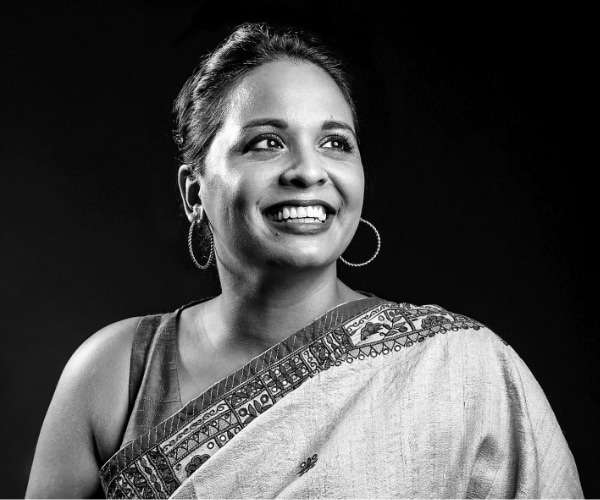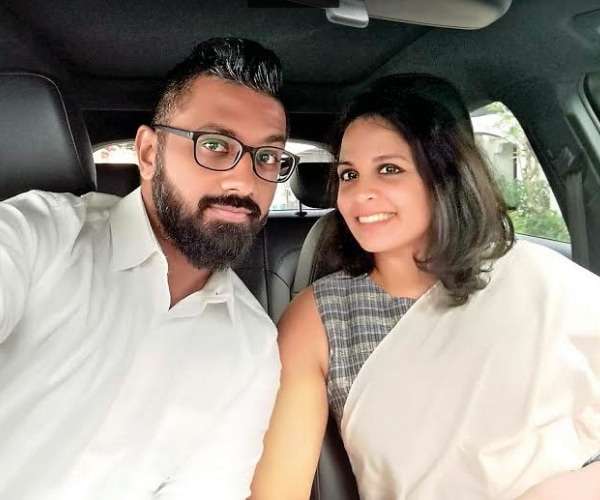Ruwani Hettiarachchi (37) is many things all at once. She’s the Chief Growth Officer at Hemas Holdings PLC, past Board Member of the Colombo Academy of Hospitality Management (William Angliss) at SLIIT and Digital Healthcare Solutions (Pvt) Ltd and currently of Healthnet Private Limited and of late 2020, the Co-Executive Producer and Screenwriter of Patta History, a passion project by her and her husband that has been recently added to the expanding list of who she is and what she does. Yet, seated across me as we begin our interview with a customary ‘tell me a little about yourself?’, she merely shrugs and answers my question in 6 simple words – “an insatiably curious person, I guess.”
Q ‘Insatiably Curious’ – what does that mean?
It means that I am curious to the point of sometimes being obsessed with things. I get fixated on ideas and I love the idea of ideas; getting into the bones of a problem, picking it apart and solving it. As a growth specialist, I think my job really lends itself to that because it gives me the opportunity to solve complex problems. I just love a big, thorny, hairy problem to solve and I’m always looking for the next thing to get hooked on and dive deep into. Sometimes, I think this makes me a really difficult, intense person maybe.
Q I’ve never heard anyone describe themselves as just curious. What exactly are you curious about?
Everything. When I was small, about 9 or 10, I was really obsessed with airline safety and had all these questions about what it takes, you know, to fly a plane or perform a really complex surgery where there are lives hanging on the balance. I came across this interesting writer, a surgeon cum aviator who set up a guidebook on cockpit rules back in the ’60s which amazingly show that the same rules that are followed in complex operating theatres are the same set of rules followed in the cockpit. I got curious about this because I always had this fear of flying as a child and I wanted to confront that. I wanted to make myself uncomfortable. I’ve felt so uncomfortable with discomfort for a really long time as a child so I learnt to ask myself: what is the scariest thing I could do? How uncomfortable will I be? Let me try that. Now I love the feeling, when I’m feeling uncomfortable, I know I’m doing something right.
Q How does your work as a growth strategist and your specialization in mergers and acquisitions tie in with this?
M&A and growth strategizing is something I’ve dedicated 15 years of my life to and it is a superb challenge at every turn. Finding new growth, new markets, new products, new opportunities that will add sizable chunks of growth into new businesses is exciting. It’s intellectually challenging work because you are coordinating with nearly 50 people trying to pull off just this one thing where the chances of success are so limited, all the while flying under the radar. It’s stressful but exhilarating and if you think about it, it’s really just one big hairy problem waiting to be solved!
Q You and your husband started Patta History late last year and it's completely opposite to what you usually do and what you specialize in! What started it all?
Patta History is actually a passion project. I found this amazing channel called Extra History on YouTube 7 years ago and they had this beautiful format where the episodes were just 15 minutes but took a deep dive into each story and I enjoyed it so much because this was exactly how I thought history should be told. The catalyst for Patta History however was when we visited the Dachau concentration camp outside the city of Munich in April 2019. In Germany, everywhere you go there are memorials to World War II and the Holocaust and even their history books confronted their past where Germans aren’t painted as victims but rather as aggressive people with flaws.
Germany has this incredible willingness to confront its history and reconcile with it and I had so much respect for that. They even have a word for it; Vergangenheitsbewältigung, which means ‘working through the past’. The camp we visited had this sign outside that said the camp is maintained by the city of Munich and I was just blown away by the German character – can you believe, now and for the rest of time, Germans will have to keep paying taxes to maintain and upkeep a place where they tortured their own people? There is no sweeping it under the rug and I thought of the effect that this small act does in terms of reconciliation and the notion of identity – what if we can do it here?
Q So Patta History is about confronting our own history?
Sri Lanka’s history is painful and long, it's full of biases and well-worn tropes and we haven’t confronted it, not even a little bit. The experiences of the same event are so polarized due to politics and there is so much jadedness and slight unwillingness to explore and confront these events. There are fundamental moments and days that changed the very course of history which we’ve never really wanted to explore. Geeshan and I had the idea for Patta History for a while and with lockdown and then the George Floyd murder, there was no better time to start it – to really confront our past.
Q You are not just the Co-Executive Producer of Patta History but you are also the Scriptwriter for the channel. But like you said, everyone’s experience of the same event is polarized and to confront our history, you must start with honesty. How do you distinguish between fact and fiction?
Before we started the channel, the first thing we thought about was the culture and the voice of Patta History. What we do and the currency we deal in is truth. We work with a historian who produces very high-quality research and I also enjoy doing my own research so we are always challenging and questioning each other on the truths and accuracy of our work. Everyone writing history has an agenda so you need to be conscious of that when you are doing the research. Patta History focuses on either a person in history or a very digestible episode in history and we cover stories that have a ‘did you know?’ factor to it. The idea is that history doesn’t repeat itself but it rhymes. For example, look at the 1915 Sinhala-Muslim riots and how that has repeatedly played out during the course of the last few years; almost the same cause, same geographical locations and the same reactions. We cover stories that have a clear resonance with what is happening today. So as a scriptwriter, I’m very mindful of the content that we put out. We make it as accurate as possible and we rely on a lot of good academic researchers to make it possible.
Q Well, the channel has been so well received ever since its very first episode and many of your subscribers comment that this is exactly how they wished they learnt history. What are your thoughts on the legitimacy of digital storytelling and its potential growth?
Well, if you fork out the argument that newer generations are inevitably going to consume content online and place a ton of reliance on it, then I think it’s definitely the medium of the future. The concept of learning history has always been about learning it from a book as a series of events to mindlessly flip through, whereas digital storytelling challenges that. With Patta History we engage conscious viewing where you have to want to watch it, you have to know what happened in the previous episodes and that inevitably makes your audience shorter. The people who watch us are a small group but they are incredibly engaged viewers and I think there is inherent value in that. Right now, I’m simply happy with the body of work we put out and as for digital media and marketing, I can’t say I know much about it! It’s a different world for me so I leave that aspect to Geeshan who seems to understand social media marketing in a way I don’t.
Q So, by day you are a growth strategist and by night you are a scriptwriter - and that’s leaving out all the other work you are involved in. It sounds pretty hectic but you seem to thrive off of it all. What are your thoughts on the ‘hustle culture’ mentality that is being hyped up these days?
Ugh, I hate it. I don’t want to come across as sanctimonious or judgemental but I find it very inauthentic and synthetic. I think it drives people nuts. Don’t get me wrong, I love the drive to succeed but I won’t do it at the risk of emptying yourself which is what the various avatars of hustle culture over the years have grown into. This idea that ‘success’ is whether or not people know your name as opposed to whether you are happy with yourself is very frightening to me. I think Sri Lankans, in general, are socially conscious but I would rather love to understand or see impact more than hustle culture. What are you doing that is making an impact? Would you still do it if you weren’t doing it on Instagram or getting publicity off of it? But on the plus side, what I’m always encouraged by is that the Sri Lankan youth are driving away from it, there is now an element of service or impact built-in everyone rather than just this drive to succeed. Personally, I love balance. I love the idea of doing nothing, I love the idea of introspection.
Q What’s your version of balance then?
My version of balance is travel and a lot of do nothing; not setting an alarm, not having a regimented day – I want to put my feet up and relax. Actually, my ideal break is a very long lunch on a weekday! I would go out on a Tuesday for lunch with friends, start at noon, have some drinks and finish late afternoon. It’s not a big thing but it’s the height of luxury for me, just the idea of it because I won’t do it every day. For me, balance is more monumental and emotional rather than a physical reward.
For more information on Patta History, check out their YouTube Channel https://www.youtube.com/c/PattaHistory/



0 Comments